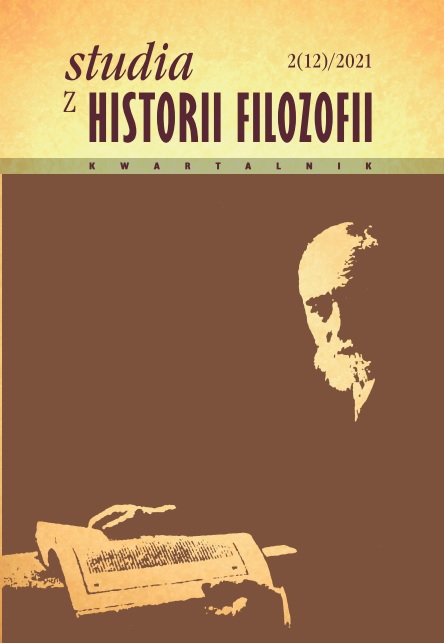Formalne warunki możliwości doświadczenia a możliwość chaosu w filozofii krytycznej Kanta
DOI:
https://doi.org/10.12775/szhf.2021.012Słowa kluczowe
Kant, chaos, doświadczenie, intelekt, kategoria przypadkowości, możliwość logiczna, możliwość realna, zjawiskoAbstrakt
In Kant’s critical philosophy, the concept of chaos means a counterfactual situation in which appearances do not merge into the unity of experience according to universal laws of understanding or particular empirical laws. The possibility of complete disagreement between the appearances and the formal conditions of thinking is incompatibly with the principles of possible experience, because appearances as to the form must accord with the universal laws of understanding. The legislation of understanding, however, does not extend to the matter of appearances and the unity of nature according to empirical laws (material unity of experience) is a contingent unity in relation to our understanding. The formal conditions of possibility of experience are therefore partial conditions and do not exhaust the whole of the conditions of experience, as such, they allow for the real possibility of empirical chaos in the sense of the lack of material unity of experience. Such possibility is synonymous with the possibility of non-existence of experience, as experience is one and includes both the formal and material unity of appearances. The main thesis of this paper is that the principles of possible experience do not eliminate the contingency of our experience and are necessarily valid under the condition of the harmony of nature in the variety of its particular empirical laws with our cognitive faculty.
Bibliografia
Allison Henry E. 2001. Kant’s Theory of Taste. A Reading of the Critique of Aesthetic Judgment. Cambridge: Cambridge University Press.
Beck Lewis W. 1981. „Über die Regelmässigkeit der Natur bei Kant”. Dialectica 35: 43–56.
Breitenbach Angela. 2009. Die Analogie von Vernunft und Natur. Eine Umweltphilosophie nach Kant (Kantstudien-Ergänzungshefte 159). Berlin/New York: Walter de Gruyter.
Cohen Hermann. 2012. Kantowska teoria doświadczenia, przeł. Andrzej J. Noras. Kęty: Wydawnictwo Marek Derewiecki.
Cramer Konrad. 1984. „Kontingenz in Kants Kritik der reinen Vernunft”. W: Probleme der „Kritik der reinen Vernunft”. Kant Tagung Marburg 1981, hrsg. Burkhard Tuschling, 143–160. Berlin/New York: Walter de Gruyter.
Cramer Konrad. 1985. Nicht reine synthetische Urteile a priori. Ein Problem der Transzendentalphilosophie Immanuel Kants. Heidelberg: Carl Winter Universitätsverlag.
Dufrenne Mikel. 1959. La notion d’a priori. Paris: Presses Universitaires de France.
Frank Manfred. 1991. „Fragmente einer Geschichte der Selbstbewuβtseins-Theorie von Kant bis Sartre”. W: Selbstbewuβtseinstheorien von Fichte bis Sartre, hrsg. Manfred Frank, 415–599. Frankfurt am Main: Suhrkamp.
Graubner Hans. 1972. Form und Wesen. Ein Beitrag zur Deutung des Formbegriffs in Kants „Kritik der reinen Vernunft” (Kantstudien-Ergänzungshefte 104). Bonn: Bouvier Verlag Herbert Grundmann.
Hartmann Nicolai. 1938. Möglichkeit und Wirklichkeit. Berlin: Walter de Gruyter & Co.
Heflik Włodzimierz. 2013. „Kants Theorie der Affinität und das Prinzip der prästabilierten Harmonie”. W: Kant und die Philosophie in weltbürgerlicher Absicht. Akten des XI. Internationalen Kant-Kongresses, hrsg. Stefano Bacin, Alfredo Ferrarin, Claudio La Rocca, Margit Ruffing, 347–358. Berlin/Boston: Walter de Gruyter.
Heflik Włodzimierz. 2013. Problem formy w perspektywie transcendentalnej u Kanta i Wittgensteina. Analiza porównawcza na podstawie „Krytyki czystego rozumu” i „Traktatu logiczno-filozoficznego”. Kraków: Wydawnictwo Antykwa.
Heidegger Martin. 2001. Pytanie o rzecz. Przyczynek do Kantowskiej nauki o zasadach transcendentalnych, przeł. Janusz Mizera. Warszawa: Wydawnictwo KR.
Jeng Jyh-Jong. 2004. Natur und Freiheit. Eine Untersuchung zu Kants Theorie der Urteilskraft. Amsterdam/New York: Editions Rodopi B.V.
Kant Immanuel. 1993. Prolegomena do wszelkiej przyszłej metafizyki, która będzie mogła wystąpić jako nauka, przeł. Benedykt Bornstein. Warszawa: Wydawnictwo Naukowe PWN.
Kant Immanuel. 2000. „Pierwsze wprowadzenie do Krytyki władzy sądzenia”, przeł. Justyna Nowotniak. W: Immanuel Kant. Pisma teleologiczne, red. Jarosław Rolewski, Mirosław Żelazny, 45–100. Toruń: Wydawnictwo Rolewski.
Kant Immanuel. 2001. Krytyka czystego rozumu, przeł. Roman Ingarden. Kęty: Wydawnictwo ANTYK.
Kant Immanuel. 2004. Krytyka władzy sądzenia, przeł. Jerzy Gałecki. Warszawa: Wydawnictwo Naukowe PWN.
Kant Immanuel. 2010. „Powszechna historia naturalna i teoria nieba”, przeł. Translatorium Filozofii Niemieckiej Instytutu Filozofii UMK pod kierunkiem Mirosława Żelaznego w składzie: Tomasz Kupś, Rafał Michalski, Mirosław Żelazny: W: Immanuel Kant, Dzieła Zebrane, red. M. Jankowski, T. Kupś. T. 1: Pisma przedkrytyczne, 195–324. Toruń: Wydawnictwo Naukowe Uniwersytetu Mikołaja Kopernika.
Kupś Tomasz. 2016. „Opus postumum” Immanuela Kanta. Toruń: Wydawnictwo Naukowe Uniwersytetu Mikołaja Kopernika.
Łaciak Piotr. 2017. „Kant a problem faktycznego istnienia »Ja myślę«. Próba analizy transcendentalno egologicznej”. Studia z Historii Filozofii 2, 8: 121–140.
Paton Herbert J. 1951. Kant’s Metaphysic of Experience. A Commentary on the First Half of the Kritik der reinen Vernunft. Vol. 2. London: George Allen & Unwin.
Prauss Gerold. 1971. Erscheinung bei Kant. Ein Problem der „Kritik der reinen Vernunft”. Berlin: Walter de Gruyter & Co.
Summa Michela. 2015. „Ein sinnloses Gewühl? Die Hypothese des Chaos und ihre Implikationen bei Kant und Husserl”. W: Ästhetisches Wissen, hrsg. Christoph Asmuth, Peter Remmers, 189–210. Berlin/Boston: De Gruyter.
Takeda Sueo. 1969. Kant und das Problem der Analogie. Eine Forschung nach dem Logos der Kantischen Philosophie. Den Haag: Martinus Nijhoff.
Weizsäcker Carl F. von. 1973 „Kants Erste Analogie der Erfahrung und die Erhaltungssätze der Physik”. W: Kant. Zur Deutung seiner Theorie von Erkennen und Handeln, hrsg. Gerold Prauss, 151–166. Gütersloh: Kiepenheuer & Witsch Köln.
Westphal Kenneth R. 1997. „Affinity, Idealism, and Naturalism: The Stability of Cinnabar and the Possibility of Experience”. Kant-Studien 88: 139–189
Pobrania
Opublikowane
Jak cytować
Numer
Dział
Statystyki
Liczba wyświetleń i pobrań: 1124
Liczba cytowań: 0



